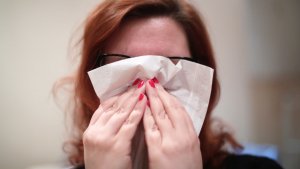1 In 2 Of Us Will Have Cancer In Our Lifetime, How Do We Adapt Work Accordingly?
What you can do to support staff members.

The number of cancer patients is rising in all ages, 90% of cancers happen in the over 50s, but we have seen a real increase in the younger working age population too.
That is, of course, scary. Cancer is brutal yes, very common yes, but not incurable and one of the most important things to remember is that most cancers in young people are curable and therefore businesses need to be prepared to support employees during the treatment these patients will need.
This treatment could be across months or years and even if the treatment is not curative, most treatments now allow patients to remain active for many years. With this in mind, employers need to be ready to deal with this and support employees accordingly.
I have, however, as an NHS consultant, seen what I can only describe as disgusting, inhuman, immoral, unethical and atrocious behaviour from employers where they have actively looked for excuses to dismiss and effectively fire patients with cancer from their jobs.
I will never ever justify this behaviour but sometimes it is ignorance and fear that sometimes drives employers to behave in this way.
From 2015, the risk of developing cancer in our lifetime is 50% (1 in 2 obviously) so it is more than likely that the employer and board of executives themselves will be affected by cancer too. It’s always worth remembering that when considering a company’s culture and ethics around cancer.
Cancer doesn’t discriminate between employee and boss. Statistics are hard to swallow, but they are true and not up for debate. What is up for debate is why cancer is more common now?
Interestingly the rise has been seen far more in rich countries. Positively there is more cancer because technology allows us to diagnose cancers more often. Young people are more aware these days and there is less tab00 around cancer and therefore, more young people are no longer afraid to seek medical attention promptly when worried.
Some people may argue there is no more cancer and we are simply better at diagnosing it, but there is no doubt that cancer is on the rise and lifestyle factors such as what we eat, drink and breath in are behind the rise in cancer across all ages. Irresponsible sun exposure, excess alcohol consumption, bad diet, air pollution and chronic stress are clear contributors.
Cancer has an inevitable impact on employees, their families and colleagues, business leaders have therefore the power to help employees adapt to new ways of working.
First of all, employers must take important steps by preventing cancer by encouraging healthy eating and a healthy mindset. Employers must offer only healthy food options at work premises instead of chips, processed and fatty foods.
Employers must ensure they have a no smoking policy at work and should also offer support aroundrelaxation, wellbeing and weight loss by offering classes in the workplace – either paid for by a company or with an employee contribution.
I have treated hundreds and hundreds of working age cancer patients over many years and I can offer insight into how we can all help affected employees and colleagues face cancer and its treatment as positively as possible.
- The first and most important thing to do if someone reveals a cancer diagnosis to you is to ask them what they want – do they want it to be kept confidential? Do they want to tell their colleagues themselves? Do they want an internal announcement to be made? What would help them the most? Some people want to be quiet about it, some don’t. Both options are okay.
- Ask about their treatment plan – this will help you to plan and help them. Treatments have come a long way and are not as toxic as they once were. Our most recent treatments are based on immunotherapy and clever targeted drugs (called precision medicine) so almost always work can continue as usual. Knowing their treatment schedule will help you plan around their role.
- Be flexible about their working lives - I find only a minority of patients of working age want to be signed off completely. There may be periods of time when they have to take time off. However most want as much normality in their lives as possible. Of course there are circumstances where I will write directly to employers appealing to them to be flexible if a patient’s job is particularly physically demanding. Therefore proactively looking at the tasks they are doing to see if there’s some flexibility there – are there less physically demanding yet important tasks they can perform?
- Encourage normality – ensure these employees are still invited to things, out of hours social events, don’t let ‘pity’ allow them to be excluded and, if in doubt, ask. I encourage all my patients to carry on with life by going to the cinema, theatre, restaurants, weddings, holidays, etc.
- Having a positive mindset is much better for their mental health and also for the mental health of their loved ones. Don’t keep asking on a daily basis ‘how are you?’ allow them to tell you when they have something to say. Treat them as you would prior to the diagnosis unless they ask you to do something different.
- Don’t forget employees who are facing a cancer journey alongside a loved one – it’s easy to forget that it’s not just the person with the diagnosis who is affected by cancer. It's their whole family. Offer support to an employee who is on a journey they never chose and would do anything to avoid.
One of the MOST important things we can all do, employers in particular, is to educate their staff around cancer and its causes – as, that cliché is absolutely true, prevention is better than cure.
Forty per cent of cancers are preventable and there are five key things we can all do in our lives to mitigate the risk of cancer and often this dovetails into an employer’s ethics around the health and wellbeing of staff. Briefly these tips will help reduce cancer risk.
*Not smoking – and I include vaping in that as it does cause damage to the lungs, though it’s too soon to know if ultimately vaping causes cancer.
*Drinking less alcohol and have alcohol free days.
*Enjoy the sun responsibly.
*Maintain a healthy weight.
*Look after your immune system (and the best way to do that is to reduce stress).
By Dr Hugo De La Peña MD, PhD, FRCP, a renowned cancer specialist, Fellow of the Royal College of Physicians, Cancer Research UK ambassador, clinical lead for Maggie's Southampton.
Thanks for signing up to Minutehack alerts.
Brilliant editorials heading your way soon.
Okay, Thanks!

